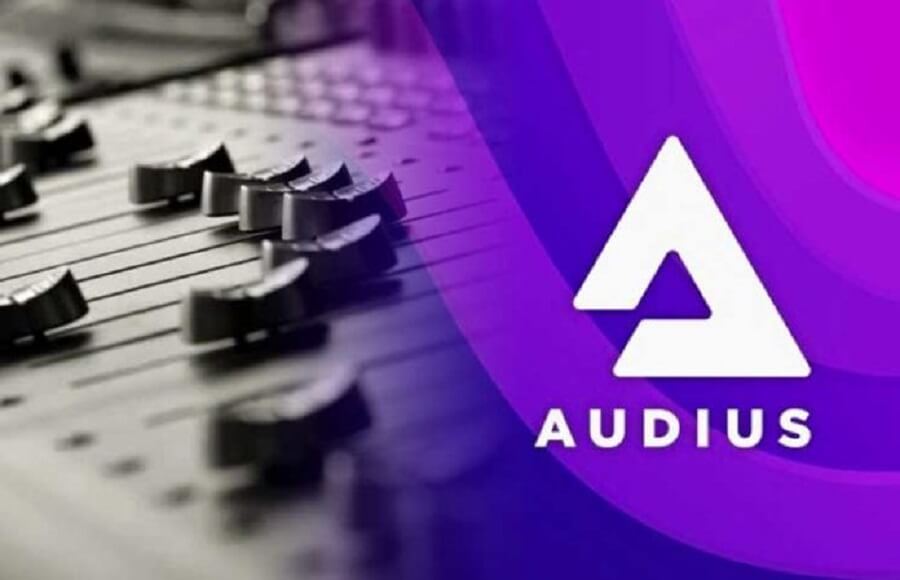Audius: Disrupting the Music Industry with Blockchain
The music industry has long been plagued by issues of artist compensation and control. Streaming services, while offering a convenient way for fans to access music, have been criticized for their meager payouts to artists. This has led to a growing movement for fairer revenue distribution in the music industry.
Enter Audius, a decentralized music streaming platform powered by blockchain technology, aiming to revolutionize the way music is distributed, monetized, and experienced. This article dives into the world of Audius, exploring its core functionalities, the $AUDIO token, its impact on the music industry, and the challenges it faces in a competitive landscape.
Part 1: A New Symphony: Decentralized Streaming with Audius
Founded in 2018 by a team of music enthusiasts and blockchain developers, Audius set out to create a music platform that empowers artists and fosters a more equitable music ecosystem. Here’s what sets Audius apart from traditional streaming services:
- Decentralized Network: Unlike centralized platforms controlled by a single entity, Audius operates on a decentralized blockchain network. This means no single entity dictates the rules or takes a significant cut of revenue. Instead, the network is secured and governed by a community of node operators who contribute computing power to maintain the platform.
- $AUDIO Token: The lifeblood of the Audius ecosystem is the $AUDIO token. This ERC-20 token serves multiple purposes:
- Governance: Holders of $AUDIO can participate in platform governance by voting on proposals that affect the future development of Audius. This ensures that the platform evolves according to the needs of its users, both artists and fans.
- Staking: Node operators who contribute computing power to the network are rewarded with $AUDIO tokens. Additionally, artists and fans can stake $AUDIO to access premium features and exclusive content.
- Payments: Artists can choose to receive a portion of their streaming revenue in $AUDIO, giving them more control over their earnings. Fans can also use $AUDIO to tip artists directly, fostering a more direct connection between creators and consumers.
- Focus on Artists: At its core, Audius is designed to empower artists. The platform offers features that directly benefit them, such as:
- Immutable Content Ownership: Artists retain complete ownership of their music uploaded to Audius. The platform leverages blockchain technology to create a tamper-proof record of ownership, giving artists more control over their intellectual property.
- Flexible Monetization: Artists have several ways to monetize their music on Audius. They can set their own streaming price, offer exclusive content to fans who stake $AUDIO, and leverage on-chain tipping functionalities.
Part 2: The Power of $AUDIO: A Tokenomics Deep Dive
The $AUDIO token plays a crucial role in the Audius ecosystem. Here’s a closer look at its tokenomics:
- Token Distribution: A total of one billion $AUDIO tokens were created, with a predetermined distribution schedule. A significant portion of tokens is allocated to the Audius Foundation, which oversees platform development and governance. Other tokens are distributed to early investors, node operators, and the community through various programs.
- Token Supply and Scarcity: The $AUDIO token supply is capped at one billion, which creates an element of scarcity. This economic model suggests that as demand for Audius grows and more users join the platform, the value of $AUDIO could potentially increase.
- Demand Drivers: Several factors can influence the demand for $AUDIO:
- Platform Adoption: As more artists and fans flock to Audius, the demand for $AUDIO for staking, governance, and payments is likely to rise.
- Integration with DeFi Protocols: If Audius integrates with decentralized finance (DeFi) protocols, it could unlock new use cases for $AUDIO, such as lending and borrowing functionalities.
- Overall Crypto Market Sentiment: The price of $AUDIO, like other cryptocurrencies, is susceptible to broader market trends. A bullish cryptocurrency market could lead to an increase in the value of $AUDIO.
Part 3: A Disruptive Force? Audius’s Impact on the Music Industry
Audius has the potential to disrupt the music industry in several ways:
- Shifting Power Dynamics: By empowering artists with ownership, control, and fairer compensation opportunities, Audius could challenge the dominance of traditional streaming services. This could lead to a more equitable music ecosystem where artists are rewarded more for their creations.
- Fan Engagement: The $AUDIO token fosters a more direct connection between artists and fans. Features like on-chain tipping and gated content create novel ways for fans to support their favorite artists.
- Transparency and Trust: Blockchain technology provides a transparent and immutable record of transactions. This can help rebuild trust between artists, fans, and the music industry. Users can be confident that artists are receiving fair compensation for their work, and artists can track their earnings with greater transparency.
However, Audius’s impact on the industry is still unfolding. Here are some challenges it needs to overcome:
- User Adoption: Competing with established streaming giants like Spotify and Apple Music presents a significant challenge. Audius needs to attract a critical mass of users, both artists and fans, to create a vibrant and sustainable ecosystem.
- Content Moderation: Decentralized platforms face unique challenges in content moderation. While Audius allows artists more creative freedom, it also needs to ensure the platform doesn’t become a breeding ground for copyrighted or harmful content.
- Regulation: The regulatory landscape surrounding cryptocurrencies and blockchain technology is still evolving. Changes in regulations could impact the way Audius operates and potentially hinder its growth.
Part 4: A Symphony of Opinions: Reactions to Audius
Audiences have garnered a mix of reactions from the music industry. Here’s a glimpse into different perspectives:
- Artists: Many independent artists are enthusiastic about Audius, seeing it as a platform that empowers them and offers fairer compensation. Some established artists, however, remain cautious, unsure whether the platform can compete with the reach and resources of traditional streaming services.
- Record Labels: The relationship between Audius and major record labels is still evolving. Some labels see Audius as a potential threat to their existing business model, while others are exploring ways to collaborate with the platform.
- Fans: Tech-savvy music fans are intrigued by the innovative features and potential of Audius. However, some fans remain hesitant to switch from established streaming services to a relatively new platform.
Part 5: The Future of the Melody: What Lies Ahead for Audius?
Predicting the future of Audius is no easy feat. However, here are some potential scenarios:
- Mainstream Adoption: If Audius can overcome user acquisition challenges and build a loyal user base, it could become a mainstream music streaming platform. This would significantly disrupt the industry and force established players to adapt their business models.
- Niche Player: Audius might carve out a niche within the music industry, catering to independent artists and a dedicated community of tech-savvy fans. This would still represent a win for artists seeking greater control and a fairer share of revenue.
- Hybrid Model: The music industry might evolve towards a hybrid model where Audius coexists with traditional streaming services. Artists could leverage both platforms to reach different audiences and explore diverse monetization opportunities.
Conclusion: A Note of Harmony
Audius represents a fascinating experiment in disrupting the music industry with blockchain technology. While its long-term impact remains to be seen, Audius undoubtedly offers a compelling alternative for artists seeking greater control and fairer compensation. As the music industry navigates the complexities of the digital age, Audius’s innovative approach has the potential to create a more equitable and artist-centric future for music.






